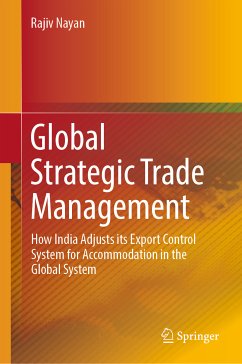The book also describes the mechanisms India is adopting in this regard. It demonstrates the shift in the Indian approach to strategic trade management, from an outspoken critic to a supporter. Politically, the country was initially skeptical of the idea of export controls because it was a target of such systems. The book also explains the tools, forces and incentives that moved India to adapt its policy on export controls or strategic trade management.
Dieser Download kann aus rechtlichen Gründen nur mit Rechnungsadresse in A, B, BG, CY, CZ, D, DK, EW, E, FIN, F, GR, HR, H, IRL, I, LT, L, LR, M, NL, PL, P, R, S, SLO, SK ausgeliefert werden.









